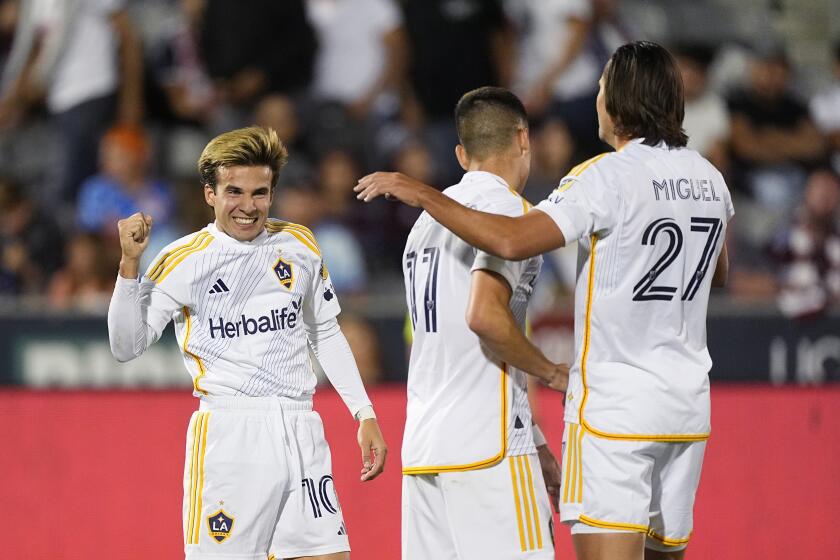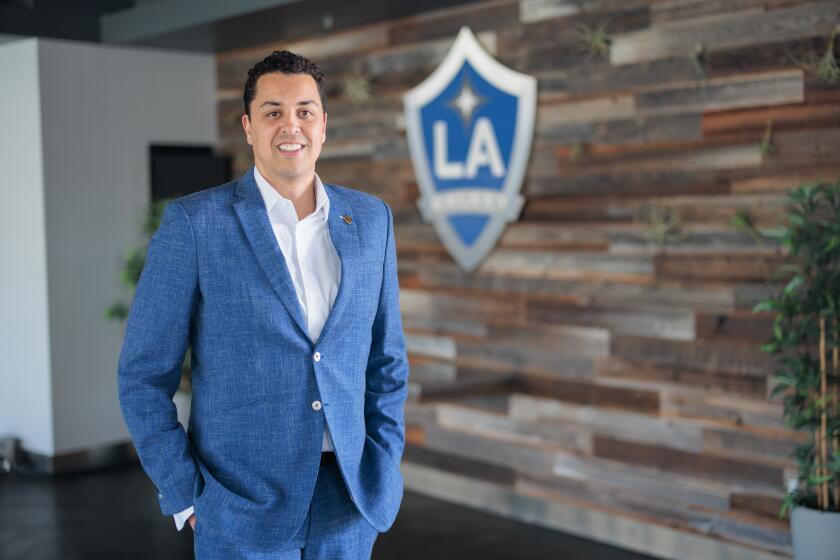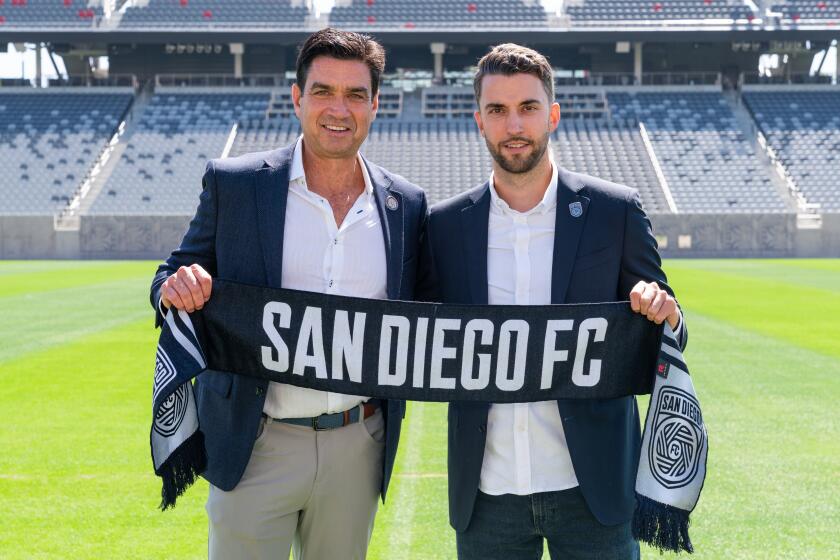MLS Should Play It Smart by Listening to Zambrano
If Major League Soccer is smart, it will start listening closely to what Galaxy Coach Octavio Zambrano has to say.
One of the topics high on Zambrano’s list of things that MLS could improve is its developmental structure.
“Adding depth is a little bit difficult in this league,” Zambrano said. “But unless we start working with younger players and making sure they understand what the program is all about, we will still be talking about lack of depth four or five years from now.
“In fact, if we start working on it now, we will bear the fruits in four or five years. But the longer we delay, the more this problem will become a chronic problem.”
Zambrano said he raised the issue at league meetings last month in Washington, but was rebuffed.
“I have to say that I’m disappointed,” he said. “I think the league has some good ideas. I think it will soon announce that some Project 40 [developmental] players will be playing in the A-League as a team, giving them the games that they didn’t get [riding the bench with their MLS teams].
“But even though that’s a good project, I don’t think it addresses the problem.
“I think that each club should be given the latitude to create its own structure of reserve and youth teams and start looking at talent at the youngest possible age and preparing that talent and making sure that when [players] come to [the senior team], they understand what the demands of the game are.
“[But] I have to say that that is not in the charter of this league, at least for the time being, and I’m disappointed.”
Zambrano believes it is not simply because of MLS finances but also a lack of long-range vision.
“They tell me it’s because of finances and I understand that,” he said. “I will take that argument any time because they know more about that than I do.
“But I also understand that if we don’t do anything right now, we will always live with this problem. We are all looking for the next generation of [players such as] Tab Ramos and John Harkes and Eric Wynalda. But where are they?
“We need to be conscious of that. I think this league would make a good financial investment if it invested in something like [a reserve and youth team program] right now.
“I don’t think you can have a professional structure without another solid structure underneath it.”
IS IT ADIOS, JORGE?
Is Jorge Campos headed for Chicago?
Don’t be surprised if the Galaxy goalkeeper winds up playing for the Fire next season at Soldier Field. The first MLS expansion draft set the stage for exactly such a switch.
Marc Rapaport, the Galaxy’s lead investor, was convinced that Washington D.C. United midfielder John Maessner would be the first player selected in the draft. Instead, the Chicago Fire made Los Angeles midfielder-defender Danny Pena the No. 1 pick.
And when the Fire made Galaxy backup goalkeeper Kevin Hartman its second pick and the No. 3 pick overall, more than a few eyebrows were raised in L.A. Had Rapaport been trying to lead the media astray by mentioning Maessner, who was picked No. 4?
Probably not, but this may be the scenario: Pena, who insists he does not want to leave Los Angeles, and Hartman, a former UCLA goalkeeper, will be sent back to the Galaxy for Campos. The pot might also be sweetened a little by the Fire.
It makes sense from the MLS standpoint. To attract a strong Latino fan base in Chicago, the Fire needs a “name” player from Mexico. Campos fits the bill perfectly. Plus, he has worn his welcome a little thin in Los Angeles by his frequent absences.
Galaxy players have said that Campos has already hinted to them that he might not be back next season.
CHICAGO HOPEFUL
Bob Bradley, who served as assistant coach under Bruce Arena as D.C. United won the first two MLS titles, was named coach of the Fire, beating out U.S. 1994 World Cup defender Fernando Clavijo, who this season coached the Seattle Sea Dogs to the Continental Indoor Soccer League championship.
Bradley, 39, played soccer at Princeton before coaching at the school for 12 years. He is intent on duplicating D.C. United’s success in Chicago, and said he recognized the potential in the Galaxy’s Pena and Hartman and made his draft picks accordingly.
“Danny Pena was simply the best player available in the draft,” Bradley said. “Hartman is a very talented player, who is quick and played quite well this year for L.A.”
As for whom he will select as an assistant, Bradley indicated that it probably will be a Latino coach, but not necessarily so.
“When Bruce and I were hired at D.C. United, I’m sure there were people who felt it was a mistake to hire two Americans,” he said. “It was embarrassing that neither of us spoke Spanish. The Spanish community has been so supportive of soccer.
“I want someone who can help us with that, someone who will work closely with the Spanish community and Spanish players. At D.C. United, we accomplished that without a Spanish assistant coach.”
HABLA FUTBOL?
The Miami Fusion really should change its name to Confusion, since it will be playing its home games at Lockhart Stadium in Fort Lauderdale, but at least it has no linguistic difficulties.
That’s because the Fusion chose Dallas Burn assistant and former Argentine national team player Carlos “Cacho” Cordoba as its first coach.
“Cacho has all of the qualities we were looking for in a head coach,” Fusion General Manager Leandro Stillitano said. “He has a strong knowledge of the American player and the inner workings of MLS. He also brings to us an international background, including his fluency in Spanish and Italian.”
Cordoba’s elevation brings the number of South American coaches in MLS to three. He joins the MetroStars’ Carlos Alberto Parreira of Brazil and the Galaxy’s Zambrano, of Ecuador.
“I am a South American coach, yes,” Zambrano said. “But having been in this country for 18 years and having [worked with] coaches from England, Germany, Yugoslavia, it has given me a different outlook to what the game is all about.
“Yes, I do keep my South American mentality when it comes to playing an entertaining kind of soccer, but I do believe in the directness of the game and that scoring is what counts.
“So I think that the combination of both [European and South American styles] is the ultimate in soccer and that’s what I’ve tried to do with every team I’ve coached.”
Cordoba probably will follow the same course.
A native of Buenos Aires, he played for Boca Juniors when Diego Maradona was still there, although these days that isn’t much of a recommendation. Cordoba came to the U.S. in 1985 to play that abomination known as indoor soccer, first with the Los Angeles Lazers and later with the Kansas City Comets and San Diego Sockers.
“I plan on playing an attack-minded and attractive style of soccer,” he said.
In other words, the Fusion will look nothing like Boca Juniors.
The smartest move Cordoba made in the expansion draft was to select San Jose Clash defender Ramiro Corrales, a member of the U.S. under-20 national team and a probable starter in the Sydney 2000 Olympics.
WHAT THEY’RE SAYING
U.S. striker Eric Wynalda, on the natural order of things:
“I think in the last couple of years the United States has established itself as a team that should be, if not at the top, then near the top [in its region].
“It’s just Mexico and ourselves, and the rest should battle it out for third. That’s the way it should be.”
Liverpool goalkeeper David James, on the prospect of being replaced by U.S. and former UCLA goalkeeper Brad Friedel, whom the Columbus Crew have agreed to sell for $1.5 million:
“If Brad Friedel makes everyone else better, then it’s a worthwhile investment.”
New England defender Francis Okaroh, snapped up by Chicago after being left unprotected in the MLS expansion draft by the New England Revolution:
“I’m totally disappointed in the whole process. It’s a slap in the face from whoever had the idea that I’m not worth being protected. It’s mind-boggling because I cared about the team and the fans cared about me.”







